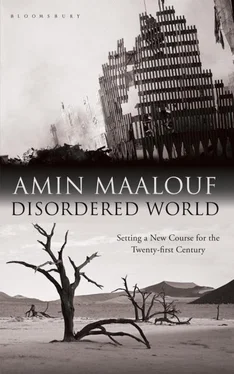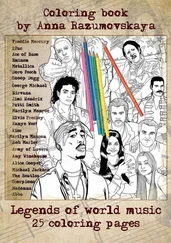If religion has never been dissolved in nationalism and still less socialism, the opposite is not the case. Given that nationalist struggles — by the Egyptians, Algerians, Iranians, Chechens and Palestinians — have essentially pitted Muslims against Christian or Jewish adversaries, they could be conducted more easily in the name of a religious community than a linguistic one. And given that the attraction of socialism for the masses resides in its promise to reduce the gulf between the rich and poor, such an objective translates perfectly into religious terms. Islam, like Christianity, has always known how to speak to the poor and draw them in. Everything in nationalism and socialism that was specific, irreducible and indissoluble would be pushed aside or else fall by the wayside by itself; everything that was permanent and substantial would be integrated into a sort of total ideology, at once nationalist and globalist, which claimed to respond to all of humanity’s needs, whether spiritual, material or concerned with identity. It became a combat ideology which attracted all those who a few decades earlier would have gravitated towards Nasserism or even communism.
With the exception of the Christian community, which was able to identify with Arab nationalism and Marxism in the past but cannot now identify with an Islamism which excludes them, all those who held defeated doctrines have been able to make their political conversion without too strong a feeling of self-betrayal. Their struggle remains the same against the perennial enemy with the ideological arms of the moment.
Why would someone have declared himself a Maoist, Guevarist or Leninist in the past? Because he wanted to fight effectively against ‘American imperialism’. Today, he pursues the same objective in the name of Islam; what’s more, he is in step with the people of his neighbourhood, whereas in the past he felt isolated with his leaflets translated from Russian or Little Red Books which no one wanted to read. Hadn’t he shouted himself hoarse repeating to young recruits that a revolutionary had to be ‘like a fish in water’? Since he started attending the mosque, that is exactly how he feels. He is no longer looked upon as a heathen trying to sell suspect goods manufactured who knows where. Now he speaks a language that everyone understands. Everyone who lives around him, young and old, knows the same verses from the same book.
It used to be very difficult getting people to accept the ability to quote from Lenin, Engels, Lin Biao, Plekhanov, Gramsci or Althusser as a sign of worth. How comforting it now is to be able to tell them that nothing that has been written or thought or invented over the centuries has as much importance as what they themselves already memorised in childhood.
What could be more powerful than a doctrine which also functions as a form of belonging? There is no need even to apply to join — belonging is a birthright, by the grace of the Creator, for ever and ever.
What is true of Islam also holds good for other religions. For several decades, Russia gave the impression that Communism was deep-rooted and the Orthodox faith just a frail survivor. But before the end of the last century, Communism was discarded like an unsuccessful graft and the country’s new leaders began going to church again.
Whether this is a cause for rejoicing or regret — and I will not conceal the fact that I do not find it particularly reassuring — it must be admitted that religious allegiances, which are passed on spontaneously from one generation to the next without the need to belong or even to believe, are much more durable than acquired beliefs. France may have stopped thinking of itself as a Catholic country a long time ago, and in fact, faith, religious practice and moral precepts it could hardly be said to be one. But it remains so in its cultural identity, just as Stalin’s Russia remained Orthodox and Atatürk’s Turkey Muslim.
This paradox is illustrated by an old Jewish story about a father who was an atheist and wanted to give his son the best possible education, and therefore sent him to the Jesuits. Despite his background, the child had to attend catechism classes in which he was taught the Catholic doctrine of the Trinity. When he got home, he asked his father if it was true that there are three Gods. His father frowned and said: ‘Listen to me, son. There is only one God and we don’t believe in him.’
A major lesson from the last century is that ideologies come and go but religions remain. Not so much the beliefs but the sense of belonging; although beliefs can be reconstructed on the foundation of that sense of belonging.
What makes religions virtually indestructible is that they offer their members a durable anchor for their identity. At other times in history, other newer, more ‘modern’ types of solidarity, such as class and nation, have seemed to be in the ascendant. But up to now it is religion which has had the last word. It was thought that it could be banished from the public sphere and confined within the borders of worship. It turned out to be difficult to confine and tame, and impossible to uproot. Those who consigned it to the history museums found themselves prematurely relegated there. Meanwhile, religion revealed itself as prosperous, and capable of conquering and often even of invading — everywhere, and especially in Islamic countries.
The very close proximity between Islam and politics is worth pondering, as it is one of the most troubling and puzzling aspects of the contemporary world.
Strangely, this phenomenon is explained in the same way by both supporters of religious radicalism and critics of Islam; the former because it is their creed and the latter because it fits with their prejudices. All agree that Islam and politics are inseparable, that it has always been thus, that it is written in the holy texts, and that it is futile to want to change it. This opinion, which is sometimes loudly proclaimed and is always implicit, is the subject of such a consensus that it possesses all the trappings of truth.
I have my doubts. If it were just a matter of the critical evaluation of a religion, its practices and beliefs, I would not spend much time on it. Although I have always lived in close proximity to Islam, I am not a specialist on the Muslim world, still less an Islamic scholar. I cannot be counted on if you are seeking to know ‘what Islam really says’. Nor should I be counted on to write that all religions preach harmony. My profound belief is that all doctrines, whether religious or secular, have within them the seeds of dogmatism and intolerance. In some individuals these seeds germinate, and in others they remain dormant.
I readily admit that I have no more idea than the next man about what Christianity, Islam, Judaism and Buddhism ‘really say’. I believe that every faith is open to an infinite number of interpretations, which depend much more on the historical trajectory of human societies than holy texts. At every stage of history, the texts say what people want to hear. Some words are suddenly illuminated which were yesterday invisible. Others, which once seemed essential, fall into oblivion. The same scriptures which used to justify the divine right of kings now accommodate democracy. And just ten lines on from a verse in praise of peace it is easy to find another which celebrates war. Every passage in the Old and New Testaments and in the Qur’an has given rise to countless readings, and it would be absurd for anyone to assert after so many centuries of interpretation and controversy that each has only one possible meaning.
I understand why the zealots do assert this; it is their role. It is difficult to stick to a particular reading of the text if you think that other interpretations are equally valid. But the observer of history, whether a believer or not, cannot take that position. From his point of view, it is not a matter of determining which interpretation of the Scriptures is compatible with the teaching of the faith, but of evaluating the influence of doctrines on the course of the world; and also conversely the influence of the course of the world on doctrines.
Читать дальше












